NewsDesk @bactiman63
The US Centers for Disease Control and Prevention (CDC) issued a travel notice for Nigeria as an ongoing Lassa fever outbreak has been reported in 26 states this year.

From the beginning of the year through April 16, Nigeria health officials report 877 confirmed Lassa fever cases, including 152 deaths among the confirmed cases (17.3% CFR).
Seventy-two (72%) of all confirmed Lassa fever cases were reported from these three states (Ondo, Edo, and Bauchi) while 28% were reported from 23 states with confirmed Lassa fever cases.
The CDC recommends the following for travelers to Nigeria:
-
- Avoid contact with rodents.
- Avoid food and material that could be contaminated with rodent urine or droppings.
- Travelers should seek medical care immediately if they develop (during or after travel) fever, chills, headache, fatigue, bleeding, trouble breathing, vomiting, facial swelling or pain in the chest, back and abdomen,. Treatment with an antiviral medicine is most effective during the early stages of illness. Call ahead before going to a healthcare facility and tell your doctor that you’ve been to an area with Lassa fever.
Lassa fever is an acute viral hemorrhagic fever spread through contact with infected rodents, their urine or droppings. Lassa fever can also be spread from person to person through contact with an infected person’s bodily fluids.
Symptoms of Lassa fever (fever, chills, headache, and fatigue) develop 1–3 weeks after infection. About 20% of people infected with Lassa fever develop severe illness that can lead to bleeding, trouble breathing, vomiting, facial swelling, pain in the chest, back, and abdomen, and sometimes death.
Treatment with ribavirin has been successful when given in the early stages of the illness.
- Nigeria reports 1686 suspected cases of meningitis, Jigawa state accounts for 74%
- Paraguay: Chikungunya continues to expand outside the metropolitan area
- Yellow fever situation in the Americas 2023
- Japan: Syphilis cases top 4,000 to date in 2023
- Japan monkeypox cases top 100
- Argentina approves Qdenga dengue vaccine
- US Embassy in Costa Rica issues health alert due to malaria outbreak
- Toronto officials investigate measles case
- Senegal reports confirmed case of Crimean-Congo hemorrhagic fever

